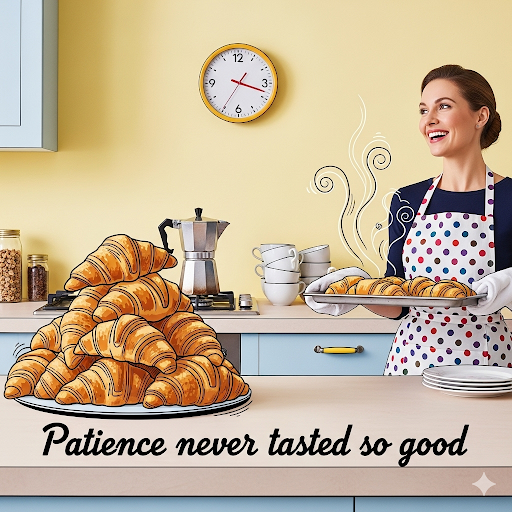
Ah, croissants. You can’t even say the word without your mouth wanting to arrange itself into a little French pout. If bread is the staff of life, then croissants are life’s mischievous encore: flaky, wicked, and entirely unnecessary, which is precisely why they are so important.
The first thing you discover when making croissants is that you are not so much baking as entering into an emotional negotiation with butter. Butter is a slippery character. Too cold and it fractures; too warm and it melts into a greasy rebellion. Somewhere in between lies the sweet spot, where it folds obediently into the dough, creating the succulent layers that will later rise into golden crescents of joy. Achieving that balance feels less like cookery and more like diplomacy.
Any Pastry Chef de Cuisine worth her Jugyeom rock salt treats croissants as if they were opera arias: majestic, dramatic, and always teetering on the edge of collapse. At 4 a.m., while the city outside still clings to dreams, pastry chefs roll and fold, roll and fold, as though they are writing lines of poetry with flour and butter. The kitchen, usually a place of clanging pans and shouted instructions, falls into a kind of reverent hush. You don’t bark orders at dough. You coax it.
What’s remarkable is how little it all looks like anything at first. A croissant begins life as a rather uninspiring square of dough, the kind of lump you might expect to find sulking at the back of the fridge. And then, after hours of patient folding, or what bakers call “turns” the lump transforms into something layered, delicate, and full of promise. It is as if you’ve tucked a tiny universe between each sheet of dough and butter. The anticipation is nearly unbearable.
There is, of course, the proving stage. If you have ever watched a croissant slowly swell on a tray, you’ll know it’s a strangely emotional sight. It’s dough dreaming of its future. You glance away for a moment, and suddenly the little rolls look plumper, fuller, as though they’ve taken a deep breath in anticipation of being adored. And yes, adored is the right word, because nobody eats a croissant without a flicker of reverence. Even the most hurried commuter pauses for a heartbeat before biting in, crumbs scattering like confetti on the morning pavement.
When they finally emerge from the oven, you experience something close to transcendence. The smell is extraordinary. Rich, buttery, almost orchestral. The layers, once folded and hidden, now puff proudly into golden arches. You tap the surface and it shatters delicately, like thin ice on a pond. Then comes the bite: a crisp crackle, followed by the warm, soft interior, a juxtaposition so succulent that language falters. Honestly, no words quite do justice to the experience. Except perhaps, “another one, please.”
And yet, for all their elegance, croissants have a wicked streak. The process is time-consuming, the results infuriatingly variable, and the calories scandalous. I’ve known hardened chefs reduced to muttering despair when their butter escaped the layers and leaked into a sorrowful puddle on the tray. Croissants punish impatience; they sniff out hubris. But that’s part of their poetry. You can’t bully a croissant into existence. You must surrender to its tempo, its stubborn insistence on slow, deliberate transformation.
Life Lessons
Making croissants also teaches you something about life. The folding, the waiting, the proving are exercises in faith. You invest hours in something that looks, frankly, unimpressive until the final act. Isn’t that what much of life is? You put in the work, often unseen, sometimes thankless, trusting that one day it will rise and become something remarkable.
So yes, croissants are food. But they are also metaphor, music, and mischief. They remind you that joy is rarely instant, that beauty comes from patience, and that the wicked indulgence of butter layered upon butter can be, paradoxically, one of life’s purest pleasures.
And if you ever find yourself in the lonely quiet of early morning, I recommend rolling out a slab of dough and folding in some butter.
There is poetry in butter layered upon butter, in the quiet patience of dough resting beneath a cloth, in the shimmering crescents that emerge at dawn. A croissant is proof that indulgence can be transcendent, that something so simple can evoke an almost emotional response. It is a reminder that joy comes not from rushing but from waiting, and that even the most wicked indulgences may, if only for a moment, taste like grace.